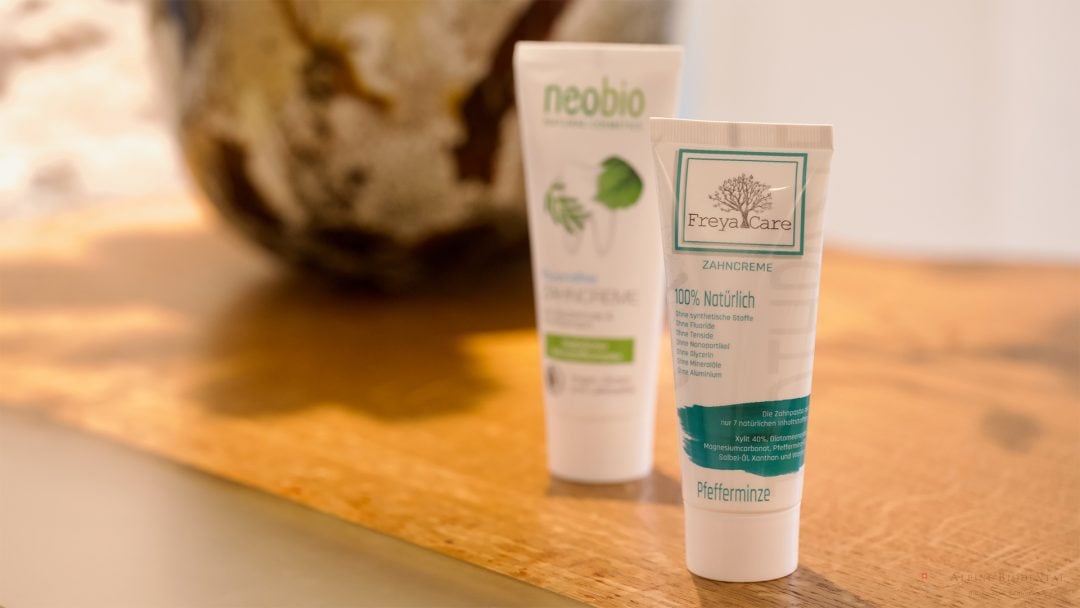Fluoride-free toothpaste

Fluoride-free toothpaste is preferred by many people, and numerous manufacturers offer fluoride-free options in their product lines.
Often, toothpaste contains the active ingredient fluoride, which is intended to make teeth more resistant to acid. While this is generally advantageous, it is crucial to thoroughly explore the topic of fluoride toothpaste to make an informed decision for your own dental care.
What is Fluoride?
Fluoride is a negatively charged ion of the element fluorine and is commonly used in dentistry or added to table salt.
It is a mineral or salt found in nature in low concentrations and is generally considered unproblematic. However, in high concentrations, fluoride can be toxic and lead to various health problems.
What is the Effect of Fluoride in Toothpaste?
Toothpaste with fluoride makes the teeth more resistant to acids, which are formed by caries bacteria and damage the tooth. This means that toothpaste containing fluoride can prevent the development of tooth decay.
In other words, fluoride from the toothpaste is deposited in the teeth and ensures that the acid formed can dissolve the tooth more slowly. As a result, a cavity can often be prevented from forming in the tooth.
This acid protection of the teeth is the reason why fluoride is added to toothpaste, although the fluoride content of the toothpaste and the fluoride compound used can vary.
Fluoride is also able to interfere with the metabolism of oral bacteria, inhibiting both bad and good bacteria.
Is Fluoride Harmful?
Many patients inquire about the potential harm of fluoride or fluoride-containing toothpaste. Answering this question is not straightforward as studies and opinions vary. Generally, the harmful effects depend significantly on the amount of fluoride consumed. Children and infants, due to their lower weight and tendency to swallow toothpaste, are at a higher risk.
Numerous studies indicate that fluoride intake through toothpaste, mouthwash, or fluoridated water is insufficient to cause negative health effects. However, other studies suggest adverse health effects, with the impact depending on body weight, fluoride dose, and duration of exposure.
Is Fluoride Toxic?
Fluoride is toxic and can even be fatal. Fluoride is also added to rat poison because it is able to inhibit blood clotting. However, the toxic effect is highly dependent on the amount of fluoride, the duration of ingestion and body weight.
Everyone is able to detoxify toxins and remove them from the body. The detoxification capacity depends on the individual and can vary from person to person. There are good detoxifiers and rather poor detoxifiers among patients.
The oral mucosa is able to absorb substances into the body. This property is also used for sublingual medication or vitamin B12 toothpaste.
Fluoride is also able to be absorbed into the body via the skin and oral mucosa. However, the amount is relatively small, so acute poisoning is unlikely.
Fluoride is often confused with fluorine. However, the toxicity and aggressiveness of fluorine (a gas) is much higher.
Who Benefits from Fluoride-Free Toothpaste?
To answer this question, it’s essential to understand what causes cavities.
Cavities result from bacterial overgrowth (high levels of cavity-causing bacteria) and poor nutrition (increased sugar consumption).
Therefore, fluoride-free toothpaste is recommended for patients aiming to address the root cause of the problem by improving their oral flora and reducing sugar consumption.
Is Fluoride-Free Toothpaste Recommended for Babies and Children?
The cause of tooth decay in babies and children is infection with the parents’ bad oral flora. The caries bacteria then eat holes in the teeth in the course of life. Consequently, this is exactly where babies and children should start: Parents should always be mindful of their own healthy oral flora to avoid transferring bad bacteria when in close contact with their child. Recommendations such as “spoons and pacifiers should not be licked” may be well-intentioned advice, but they do not prevent the transfer of bacterial flora to the child.
If the parents have healthy oral flora, this is also transferred to the child, which is an excellent caries prophylaxis for later life. Consequently, baby toothpaste and children’s toothpaste can be dispensed with for babies and children if the little ones have a good oral flora and the parents pay specific attention to nutrition and dental care.
In any case, it is important that milk teeth are checked regularly by a dentist specializing in children.
Improving Oral Bacterial Flora
Our dental practice can effectively optimize oral bacterial flora, reducing the decay process in the oral cavity and minimizing issues such as cavities, periodontitis, and bad breath. This prophylaxis relies on the use of oxygen, ensuring a mild and non-traumatic approach.
Ingredients in Fluoride-Free Toothpaste
There are now many different fluoride-free toothpastes on the market. When making your choice, it is important to pay attention to the composition.
The toothpaste should not contain any ingredients that are harmful to health and the list of additives should be small and manageable.
Ingredients that should be avoided:
- Titanium compounds such as titanium dioxide
- Aluminum
- Sodium lauryl sulphate and other surfactants
- Synthetic substances
- Nanoparticles
As mentioned above, such substances can enter the body via the oral mucosa and have a detrimental effect.
Recommended Fluoride-Free Toothpaste
Finding a high-quality fluoride-free toothpaste can be challenging due to hidden ingredients that may pose health risks. Before making a purchase, carefully examine the toothpaste’s ingredients.
Fluoride-Free Toothpaste
There are various fluoride-free toothpaste options on the market, and it’s essential to choose those without harmful ingredients.
One recommended fluoride-free toothpaste is Freyacare, containing Xylitol, magnesium carbonate, diatomaceous earth, and essential oils. Critical substances suspected of impacting health negatively are not part of its ingredients.
However, the decision to use fluoride-containing or fluoride-free toothpaste ultimately lies with the patient.
Tea Tree Oil Toothpaste
Toothpaste with tea tree oil has antibacterial and anti-inflammatory properties, aiding in the fight against cavities and gum inflammation. However, ingredient variations necessitate a critical examination.
Aloe Vera Toothpaste
Aloe vera in toothpaste also exhibits antibacterial and anti-inflammatory effects, providing some prophylaxis against cavities and periodontitis. Composition can vary significantly.
Weleda Sole Toothpaste
Weleda Sole Toothpaste contains sea salt, known for its disinfectant and anti-inflammatory effects, while also stimulating saliva flow. The ingredients are generally considered safe.
B12 Toothpaste
Vitamin B12 is added to the so-called B12 toothpaste. The vitamin B12 can then be absorbed into the body via the mucous membrane.
This type of toothpaste is particularly recommended for vitamin B12 deficiency, which is often the case for vegans. The absorption of vitamin B12 when brushing your teeth can effectively counteract B12 deficiency.
For the vitamin B12 form in toothpaste, you should ideally use methylcobalamin, adenosylcobalamin or hydroxocobalamin. The synthetic form cyanocobalamin is suspected of being potentially harmful to health.
B12 toothpaste is included here because it is often fluoride-free. However, there is also B12 toothpaste with fluoride.
Dr. med. dent. Tobias Steinherr M. Sc.
The demand for toothpaste without fluoride is growing. Learn more about this topic here.

Frequently asked Questions about Fluoride in Toothpaste
Many patients are uncertain about fluoride in toothpaste. It’s crucial to critically examine the topic and discuss it with dentists. If you have further questions, feel free to schedule an appointment, and we will assist you.
The truth about fluoride is that opinions differ widely. There are societies, doctors and dentists who recommend fluoride and others who are more critical of its use.
There are many studies that show the benefits of fluoride (caries prophylaxis) and that there are no disadvantages to be feared with small amounts. At the same time, there are many studies that show various negative health effects. When analyzing the studies, it is always important to pay attention to how they are structured, what interests are behind them and what fluoride concentrations are used.
It is also true that fluoride does not address the cause of tooth decay. Fluoride makes the teeth more resistant to acid, making it a caries prophylaxis. However, the cause of tooth decay is the incorrect colonization of the oral flora with caries bacteria and a diet high in sugar and carbohydrates – not a lack of fluoride.
Ultimately, the use of fluoride has advantages and disadvantages, which is why a recommendation should be considered on an individual basis. If you are unsure, you are welcome to make an appointment with one of our dentists.
Such a question can only be answered after a detailed medical history and examination.
Patients who have a healthy oral flora or effectively optimize it have a low risk of tooth decay. Consequently, such patients can use a fluoride-free toothpaste.
However, different measures to build up the oral flora and diet should definitely be discussed with the dentist. In this way, you can ensure that your teeth remain healthy in the long term and that caries formation does not increase.
Further information
Here you will find further information on the subject for a deeper insight.